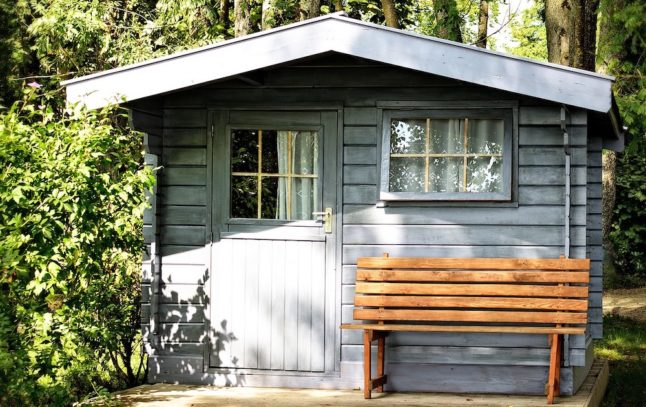There may be many different reasons you want to put up a shed or hut in your garden. You may want a tool shed for your gardening equipment, a writing retreat, a playhouse for your kids, for extra storage, or even a changing room if you have a pool.
You may think that it’s your property so you can do what you like with it and put whatever you want in your garden, but it’s not quite that simple. Town halls or ayuntamientos have many different rules and regulations and could fine you for putting up a shed without the proper permit.
You need a permit for many works you undertake on your own property, even if they’re seemingly minor interior renovations or changes, not just big extensions. For example, you need what is called a ‘Licencia de Obra Menor‘ for all minor works such as installing a new bathroom or kitchen, changing the floors or redoing the electrics.
READ ALSO: Do I need planning permission in Spain and how do I apply for it?
The answer to whether or not you need a permit or licence for a wooden shed in your garden is in fact not a simple one and depends on many different factors. This could be the town or municipality you live in, the size of the shed you want to erect, your neighbours and whether or not it spoils the view.
Size
The first thing you need to consider is the size of your shed. Generally speaking, the following rules apply:
Sheds less than 5 m2 – If your wooden shed has an area of less than five square metres, you do not need to apply for any construction permit, nor do you need to inform the town hall of your intention to build or erect one. Wooden sheds that do not require masonry works, that are easy to move, and do not exceed 1.80m in height may also not require a licence.
Sheds between 5 and 20 m2 – A wooden shed of less than 20 square metres does not require a building permit but does require a prior declaration of work. This will allow the City Council to be aware of your intention to build one and let you know if there are any limitations.
Sheds over 20 m2 – If your shed is larger than 20 square metres, it is necessary to apply for a building permit from your town hall. You also need to provide details on the type of materials and design of the shed, to find out what its impact will be and what considerations must be taken.
Style and materials
- The design, characteristics and materials may also affect the regulations you have to follow, depending on where you live. In some areas, you can simply bolt them to the ground instead of needing some type of foundation.
- In other municipalities, you will be required to build the shed about 20 centimetres from the ground to prevent its installation from degrading the environment. Therefore it will need to be set on bricks or small stilts.
Location
If you live in a protected area, such as a historic town or a natural park, there may even be more rules and permits you’ll require.
Consult your deeds
Before contacting anyone, you can also have a look to find out about what your property deeds say. Is your land developable and is there anything you need to consider, such as not spoiling the view for a neighbour or not building over a certain height?
If you’re in any doubt about what type of shed you can and can’t build or if you need a permit, the best option before you buy anything is to go to your town hall or council to find out about your local regulations.
You should also contact urban planning to find out if there are any other requirements you need to meet.



 Please whitelist us to continue reading.
Please whitelist us to continue reading.
Member comments